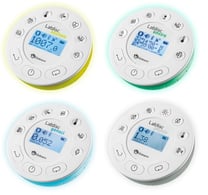
We’re back from the National Science Teachers Association’s 2018 National Conference on Science Education in Atlanta, Georgia! PowerUpED graciously gave us and Globisens, makers of the Labdisc portable STEM lab, the chance to collaborate with them on a workshop called “Make Science Relevant and Engaging,” which centered around the Labdisc mobile data logger.
Presenters and Experts
We kicked up the collaborative approach even further by giving our audience a chance to hear about the Labdisc from every perspective: maker, distributor, educators, and student. Along with Dovi Bruker, CEO of Globisens, and Jerry Gaillard, director of sales for PowerUpED, two other people joined in as workshop presenters:
- Dr. Donald White, content specialist for Coweta County School System and president of the George Science Teachers Association
- Regina Ahmann, zoology and AP environmental science teacher at East Coweta High School
Coweta County School System educators and students have been working with Labdiscs since September 2016, and Regina even participated in our very first Boxlight STEM Day—so they have definitely become experts on the device! They joined us in explaining and, even better, demonstrating how using a wireless mobile data logger like Labdisc ensures mobility in order for science experiments to be easily performed anywhere
Easy-To-Use Portable STEM Lab
The Labdisc’s built-in sensors and easy-to-use, OS-agnostic analysis software enables it to serve as a complete lab for inquiry-based learning in a variety of science fields, including biology, chemistry, physics, environmental science, and geography. The device also solves the time and budgetary challenges of performing science experiments since a typical lab session requires 90 items to set up and calibrate. Plus, the Labdisc replaces boxes of equipment with an all-in-one, science lab that conveniently fits in the palm of a student’s hand.
Benefits of Hands-On Experiments
The benefits of the Labdisc are backed by research about the value of hands-on science learning. For example, TEEMSS—funded by the National Science Foundation—reported in 2007 that students who used computers and probeware showed significant learning gains. Additionally, the 2015 UK GATSBY report recommended students should experience a practical activity in at least half of their science lessons.
The various Labdiscs are designed for different fields, covering every science domain. For example, the General Science unit has the following built-in sensors and tools:
- Air Pressure
- Ambient Temperature
- Current
- Distance
- GPS
- Light
- Microphone
- pH
- Relative Humidity
- Sound Level
- Temperature
- Voltage
- Universal Input
 Even better, there are different Labdiscs with different arrays of embedded sensors and tools (e.g. our physics-focused Labdisc and our biology and chemistry Labdisc). With each of these STEM science labs, users can take their science classroom anywhere in or outside of the school building. A Labdisc helps students connect and engage with science wherever they are!
Even better, there are different Labdiscs with different arrays of embedded sensors and tools (e.g. our physics-focused Labdisc and our biology and chemistry Labdisc). With each of these STEM science labs, users can take their science classroom anywhere in or outside of the school building. A Labdisc helps students connect and engage with science wherever they are!
Sharing the Impact on Their Schools
Dr. White and Regina shared how the Labdiscs have affected the way she and the other teachers conduct science experiments, making it easier and quicker to collect data for different types of experiments. She also shared that she appreciated how the devices graph data for users so that they can analyze the data right away instead of having to spend a whole hour creating the graph themselves.
They discussed how students can conduct real-time data-gathering experiments to show how easy, fun, and flexible the lab work can be. Some easy experiments to get students engaged are measuring the pH of beverages such as soda, observing and analyzing the free fall motion of a bouncing ping pong ball, and recording sound waves and sound wave interference.
The audience got the chance to see a quick movie about elementary students attaching the Labdisc to a weather balloon and sending it up 100,000 feet above the ground—that’s higher than a typical airplane flies! After viewing the stunning video of its ascent and descent, they saw all of the data that the Labdisc had recorded, including altitude, external temperature, and atmospheric pressure, along with the corresponding graphs. If you didn’t have a chance to attend the workshop, check out the video here.
Thanks to the Coweta County educators for joining us for the workshop. All of the attendees found it fun and informative, and it’s always a pleasure to hear what a positive effect the Labdisc has had in that district!
Learn how you can make hands-on STEM experiments easy and affordable with the Labdisc data logger.>>



